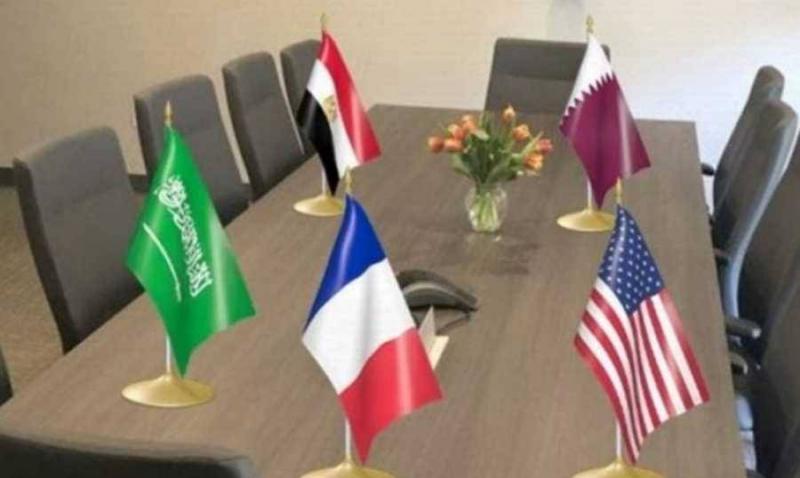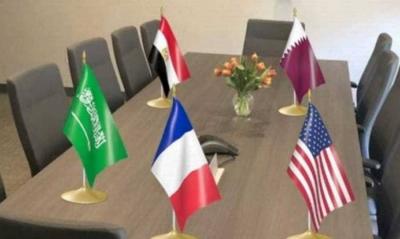The readiness of the ambassadors from the Quintet countries in Lebanon to undertake a new series of meetings next week has captured the attention of political and diplomatic circles. They are observing this move in hopes of achieving a breakthrough that could help extract the presidential election from the turmoil of obstruction by electing a new president. This interest intensifies especially with the announcement of a meeting scheduled with Maronite Patriarch Bechara al-Rahi and Speaker Nabih Berri on the upcoming Monday, followed by meetings the next day that, so far, only include former President Michel Aoun and Lebanese Forces leader Samir Geagea. This circumstance has led the parliamentary "Moderation" bloc to hesitate in initiating a second round of discussions with parliamentary bloc heads to promote their proposal aimed at halting the extension of the presidential void.
Sources closely following the actions of the Moderation bloc informed "Asharq Al-Awsat" that they decided to postpone their second round with parliamentary leaders to allow the ambassadors from the Quintet countries to raise the level of attention towards electing a president and to position it as a key agenda item for those concerned with the election, separate from the ongoing hostilities in southern Lebanon and the war between Hamas and Israel in Gaza.
The parliamentary sources noted that the Moderation bloc postponed this week's planned communications, which include the Lebanese Forces and the Phalange party, to avoid being perceived as undermining the task assigned to the Quintet ambassadors, who unanimously support the initiative as it seeks to facilitate the presidential election without linking it to the ongoing war in Gaza, despite Hezbollah Secretary-General Hassan Nasrallah maintaining his backing for the conflict in Gaza.
The same sources highlighted the desire of the Quintet ambassadors—Saudi Walid Bukhari, American Lisa Johnson, Egyptian Alaa Moussa, French Herve Magro, and Qatari Saud bin Abdul Rahman Al Thani—to meet with Patriarch al-Rahi, President Aoun, Geagea, and Speaker Berri. They noted that their focus on Maronite leadership aligns with Bkerke's aspirations to leverage their influence in paving the way for the presidential election, prompting the church to engage actively in encouraging them to soften their positions and approach the presidential matter with flexibility and openness.
The Quintet ambassadors are approaching their initiatives with the belief that Lebanon has no interest in linking the presidential election to the evolving situation on the Gaza front. Furthermore, they questioned the reasons behind Nasrallah's insistence on continuing support for Hamas without mentioning the presidential election, suggesting that he does not intend to widen the war by giving Israel justifications for further escalation.
The parliamentary sources confirmed that Hezbollah has requested the Moderation bloc to delay their stance on the initiative aimed at reviving the presidential file, stating that it will not finalize its position until the prospects of the current war in Gaza become clearer. From the opposition's perspective, Hezbollah's approach to the presidential election is influenced by developments in Gaza, indicating that they prefer to exercise caution.
In other words, according to sources within the opposition speaking to "Asharq Al-Awsat," Hezbollah is advocating for a president who aligns with the situation on the Gaza front, while continuing to support the candidacy of former Minister Suleiman Frangieh for the presidency, without being prepared to endorse a third presidential option.
The opposition has warned of a scheme aimed at extending the presidential vacancy beyond January 10, following the expiration of Army Commander Joseph Aoun's term, asserting that certain factions within the resistance axis back this approach, claiming that merely retiring him would diminish his presidential chances, unlike the current domestic and international dealings regarding his candidacy as one of the top contenders.
However, new developments regarding the Quintet's efforts reveal that Qatar has informed those concerned that it does not have a presidential candidate, contradicting prior assumptions, emphasizing its priority for the parliamentary blocs to elect a president sooner rather than later. Should a ceasefire be reached in Gaza, they believe it is essential for all parties to seize the opportunity to halt the obstruction of the presidential election, while ensuring Hezbollah does not escalate the conflict further.
Consequently, the Quintet ambassadors have not merely decided to reactivate their initiative in support of calling on parliamentary blocs to elect a president as a formality but are committed to intensifying efforts to ensure the presidential election process is prioritized, requiring all concerned parties to facilitate the necessary measures to overcome the obstacles delaying this essential electoral process.




